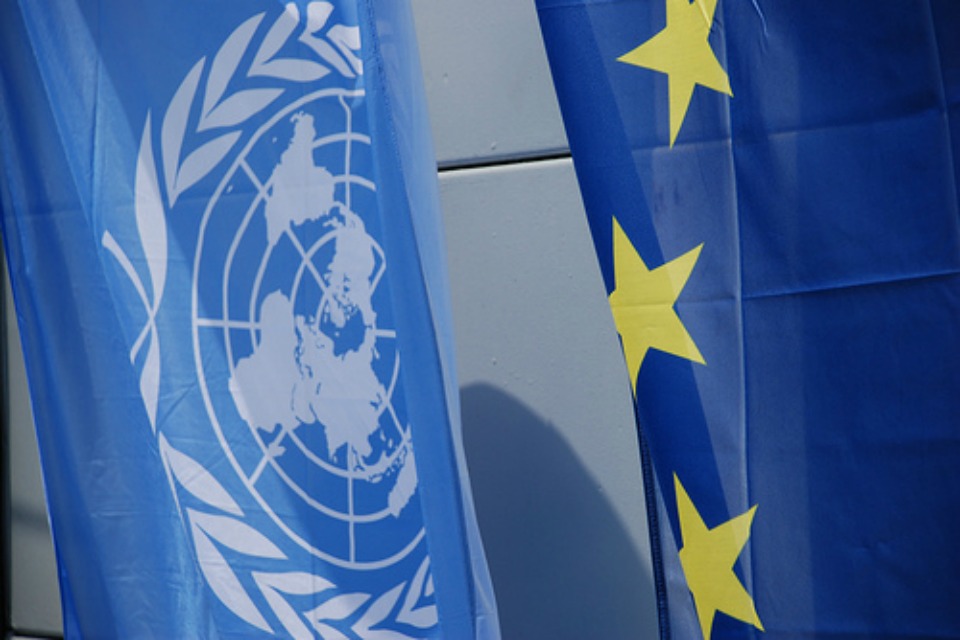"EU-UN cooperation has proved its worth on many occasions."
Statement by Ambassador Mark Lyall Grant of the UK Mission to the UN, at the Security Council briefing on Regional Cooperation

Thank you Mr President. And I would like to thank the Secretary-General for his statement this morning. And let me join others in welcoming High Representative Mogherini to New York to brief us for the first time today. The first of many such briefings I hope. At the outset I would like to offer condolences on behalf of the United Kingdom to the families of those killed and injured in two terrorist attacks in Mali over the weekend, among them both UN peacekeepers and UN staff, and also EU Delegation staff.
Mr President, The importance and value of the UN’s cooperation with the European Union and other regional organisations speaks for itself. In 1945 Chapter VIII of the Charter specifically encouraged regional arrangements to play their part in pacific settlement of local disputes. And the following 70 years have borne out that foresight.
The European Union, just like the UN itself, arose as a direct consequence of the Second World War. Building closer ties between European countries to foster mutual understanding and cooperation has led to a more secure Europe that has delivered increased prosperity for citizens of EU member states.
The echoes of Article 1 of the United Nations Charter are clear to see in this progress. Both organisations champion human rights, the rule of law, development, and pacific settlement of disputes. Among many other things, International Women’s Day yesterday highlighted the role that women play in international peace and security – another issue to which both organisations give particular emphasis to.
Through championing these values, both organisations contribute to the maintenance of international peace and security.
Mr President, This is apparent in Somalia, where an African Union mission with UN and EU logistical and financial support has helped drive back Al-Shabaab and allow the re-emergence of a legitimate Somali government working for the Somali people. In the Central African Republic, an EU force helped to bridge the transition from an African Union mission to a United Nations one.
The European Union is also actively supporting the UN peacekeeping mission in Mali.
EU support to transitions has worked successfully in reverse as well. The EU force in Bosnia has taken the place of the UN peacekeeping mission there; supporting stability in that part of Europe and allowing the people of Bosnia to choose their own future. The continued presence of EUFOR Operation Althea, with a UN Chapter VII mandate, is vital to prevent any return to the violent ethnic divisions that once plagued the region.
And away from peacekeeping, the EU’s leadership of the E3+3 negotiations with Iran on the nuclear dossier is another strong example of how our co-operation can help counter nuclear proliferation and preserve international peace and security. That we may be close to a deal is in large part due to the diplomatic efforts of former EU High Representative Cathy Ashton and I hope that under your guidance we will soon see a successful outcome to the talks.
The EU is also supporting UN efforts in Libya, and leading on the dialogUE between Belgrade and Pristina.
While the EU can and does support the UN in a number of ways, there are situations where the UN is unable to take action because of the position of certain Council members. In the face of such situations the European Union can still speak out and act, based on the shared values I have set out. This is particularly the case with regard to the situation in Ukraine.
When this Council failed to condemn Russia’s illegal annexation of Crimea last year, the European Union delivered a clear message and backed this up with clear consequences for Russia. As Russia increased its support for the separatists in Eastern Ukraine and the violence there escalated, the EU ratcheted up the sanctions regime. And as Ukraine’s economy suffered, the EU provided significant financial support.
With the Minsk agreements, an end to the hostilities is possible. But implementation of the agreements needs to be verified and effectively monitored by the OSCE if trust is to be rebuilt.
Mr President, EU-UN cooperation has proved its worth on numerous occasions. The two organisations will continue to work together, complementing each others’ efforts and, thereby strengthening the principles and purposes of the UN Charter.
I thank you.